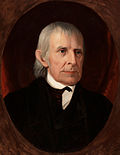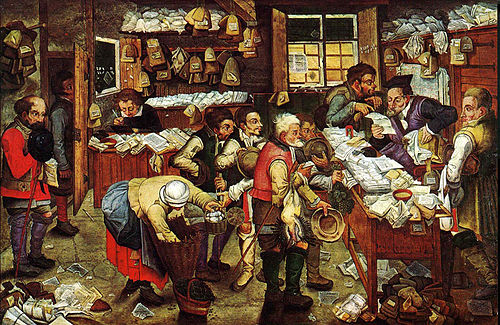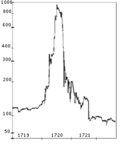
Back بوابة:الاقتصاد Arabic Portal:İqtisadiyyat Azerbaijani প্রবেশদ্বার:অর্থনীতি Bengali/Bangla Portal:Ekonomija BS Portal:Economia Catalan دەروازە:ئابووری CKB Portál:Ekonomie Czech Portal:Wirtschaft German Πύλη:Οικονομία Greek Portal:Economía Spanish
The Business and Economics Portal  Business is the practice of making one's living or making money by producing or buying and selling products (such as goods and services). It is also "any activity or enterprise entered into for profit." A business entity is not necessarily separate from the owner and the creditors can hold the owner liable for debts the business has acquired. The taxation system for businesses is different from that of the corporates. A business structure does not allow for corporate tax rates. The proprietor is personally taxed on all income from the business. A distinction is made in law and public offices between the term business and a company such as a corporation or cooperative. Colloquially, the terms are used interchangeably. (Full article...) Economics (/ˌɛkəˈnɒmɪks, ˌiːkə-/) is a social science that studies the production, distribution, and consumption of goods and services. Economics focuses on the behaviour and interactions of economic agents and how economies work. Microeconomics analyses what is viewed as basic elements within economies, including individual agents and markets, their interactions, and the outcomes of interactions. Individual agents may include, for example, households, firms, buyers, and sellers. Macroeconomics analyses economies as systems where production, distribution, consumption, savings, and investment expenditure interact; and the factors of production affecting them, such as: labour, capital, land, and enterprise, inflation, economic growth, and public policies that impact these elements. It also seeks to analyse and describe the global economy. (Full article...) Selected articleJohn Adam Eckfeldt (June 15, 1769 – February 6, 1852; usually Adam Eckfeldt) was a worker and official in the early days of the United States Mint. A lifelong Philadelphian, Eckfeldt served as the second chief coiner of the Mint, from 1814 until 1839. Eckfeldt's father owned a large smithy and involved himself in early attempts at American coinage. Adam Eckfeldt built early presses for the Mint, engraved some of its early dies, and was responsible for the designs of early American copper coinage, as well as the 1792 half disme which some authorities consider the first United States coin. He was appointed assistant coiner of the Mint in 1796, and became chief coiner on his predecessor's death in 1814. Selected image
Selected economy} The economy of Ghana has a diverse and rich resource base, including the manufacturing and export of digital technology goods, automotive and ship construction and export, and the export of resources such as hydrocarbons and industrial minerals. The Ghanaian domestic economy in 2012 revolved around services, which accounted for 50% of GDP and employed 28% of the work force. Besides the industrialization associated with minerals and oil, industrial development in Ghana remains basic, often associated with plastics (such as chairs, plastic bags, razors, and pens). 53.6% of Ghana's workforce were employed in agriculture in 2013.[outdated statistic] (Full article...) Selected quote"For a long time men failed to realize that the transition from the classical theory of value to the subjective theory of value was much more than the substitution of a more satisfactory theory of market exchange for a less satisfactory one. The classical economists met in the pursuit of their investigations an obstacle which they failed to remove, the apparent antinomy of value. Their general theory of choice and preference goes far beyond the horizon which encompassed the scope of economic problems as circumscribed by the economists from Cantillon, Hume and Adam Smith down to John Stuart Mill. It is much more merely a theory of the "economic side" of human endeavors and of man's striving for commodities and an improvement in his material well-being. It is the science of every kind of human action. Choosing determines all human decisions. In making his choice man chooses not only between various material things and services. All human values are offered for option. All ends and all means, both material and ideal issues, the sublime and the base, the noble and the ignoble, are ranged in a single row and subjected to a decision which picks out one thing and sets aside another. Nothing that men aim at or want to avoid remains outside of this arrangement into a unique scale of gradation and preference. The modern theory of value widens the scientific horizon and enlarges the field of economic studies. Out of the political economy of the classical school emerges the general theory of human action, praxeology. The economic or catallactic problems are embedded in a more general science, and can no longer be severed from this connection. No treatment of economic problems proper can avoid starting from acts of choice; economics becomes a part, although the hitherto best elaborated part, of a more universal science, praxeology."
TopicsRelated WikiProjectsDid you know (auto-generated) -
On this day in business history
General imagesThe following are images from various business-related articles on Wikipedia.
More did you know
Business news
SubcategoriesRelated portals
Things you can doUrgent and important articles are bold
WikimediaThe following Wikimedia Foundation sister projects provide more on this subject:
SourcesDiscover Wikipedia using portals |








































